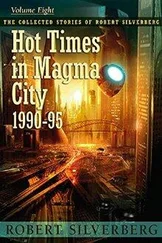Robert Silverberg - How it Was When the Past Went Away
Здесь есть возможность читать онлайн «Robert Silverberg - How it Was When the Past Went Away» весь текст электронной книги совершенно бесплатно (целиком полную версию без сокращений). В некоторых случаях можно слушать аудио, скачать через торрент в формате fb2 и присутствует краткое содержание. Год выпуска: 2007, ISBN: 2007, Издательство: Subterranean Press, Жанр: Фантастика и фэнтези, на английском языке. Описание произведения, (предисловие) а так же отзывы посетителей доступны на портале библиотеки ЛибКат.
- Название:How it Was When the Past Went Away
- Автор:
- Издательство:Subterranean Press
- Жанр:
- Год:2007
- ISBN:978-1-59606-089-0
- Рейтинг книги:4 / 5. Голосов: 1
-
Избранное:Добавить в избранное
- Отзывы:
-
Ваша оценка:
- 80
- 1
- 2
- 3
- 4
- 5
How it Was When the Past Went Away: краткое содержание, описание и аннотация
Предлагаем к чтению аннотацию, описание, краткое содержание или предисловие (зависит от того, что написал сам автор книги «How it Was When the Past Went Away»). Если вы не нашли необходимую информацию о книге — напишите в комментариях, мы постараемся отыскать её.
How it Was When the Past Went Away — читать онлайн бесплатно полную книгу (весь текст) целиком
Ниже представлен текст книги, разбитый по страницам. Система сохранения места последней прочитанной страницы, позволяет с удобством читать онлайн бесплатно книгу «How it Was When the Past Went Away», без необходимости каждый раз заново искать на чём Вы остановились. Поставьте закладку, и сможете в любой момент перейти на страницу, на которой закончили чтение.
Интервал:
Закладка:
She put her hands to her lips in fear. Bryce felt a sudden warm urge to protect this lovely stranger, to guard and comfort her, and he realized he must be in love with her, even though he couldn’t remember who she was. He crossed the room to her and seized her in a brief, tight embrace; she responded eagerly, shivering a little. By a quarter to eight they were out of the house and heading for the hospital through unusually light traffic. Bryce led the girl quickly to the staff lounge. Ted Kamakura was there already, in uniform. The little Japanese psychiatrist nodded curtly and said, “Morning, Tim.”
Then he blinked. “Good morning, Lisa. How come you’re here?”
“You know her?” Bryce asked.
“What kind of a question is that?”
“A deadly serious one.”
“Of course I know her,” Kamakura said, and his smile of greeting abruptly faded. “Why? Is something wrong about that?”
“You may know her, but I don’t,” said Bryce.
“Oh, God. Not you too!”
“Tell me who she is, Ted.”
“She’s your wife, Tim. You married her five years ago.”
By half past eleven Thursday morning the Gerards had everything set up and going smoothly for the lunch rush at the Petit Pois. The soup caldron was bubbling, the escargot trays were ready to be popped in the oven, the sauces were taking form. Pierre Gerard was a bit surprised when most of the lunchtime regulars failed to show up. Even Mr. Munson, always punctual at half past eleven, did not arrive. Some of these men had not missed weekday lunch at the Petit Pois in fifteen years. Something terrible must have happened on the stock market, Pierre thought, to have kept all these financial men at their desks, and they were too busy to call him and cancel their usual tables. That must be the answer. It was impossible that any of the regulars would forget to call him. The stock market must be exploding. Pierre made a mental note to call his broker after lunch and find out what was going on.
About two Thursday afternoon, Paul Mueller stopped into Metchnikoff’s Art Supplies in North Beach to try to get a welding pen, some raw metal, loudspeaker paint, and the rest of the things he needed for the rebirth of his sculpting career. Metchnikoff greeted him sourly with, “No credit at all, Mr. Mueller, not even a nickel!”
“It’s all right. I’m a cash customer this time.”
The dealer brightened. “In that case it’s all right, maybe. You finished with your troubles?”
“I hope so,” Mueller said.
He gave the order. It came to about $2,300; when the time came to pay, he explained that he simply had to run down to Montgomery Street to pick up the cash from his friend Freddy Munson, who was holding three bigs for him. Metchnikoff began to glower again. “Five minutes!” Mueller called. “I’ll be back in five minutes!” But when he got to Munson’s office, he found the place in confusion, and Munson wasn’t there. “Did he leave an envelope for a Mr. Mueller?” he asked a distraught secretary. “I was supposed to pick something important up here this afternoon. Would you please check?” The girl simply ran away from him. So did the next girl. A burly broker told him to get out of the office. “We’re closed, fellow,” he shouted. Baffled, Mueller left.
Not daring to return to Metchnikoff’s with the news that he hadn’t been able to raise the cash after all, Mueller simply went home. Three dunning robots were camped outside his door, and each one began to croak its cry of doom as he approached. “Sorry,” Mueller said, “I can’t remember a thing about any of this stuff,” and he went inside and sat down on the bare floor, angry, thinking of the brilliant pieces he could be turning out if he could only get his hands on the tools of his trade. He made sketches instead. At least the ghouls had left him with pencil and paper. Not as efficient as a computer screen and a light-pen, maybe, but Michelangelo and Benvenuto Cellini had managed to make out all right without computer screens and light-pens.
At four o’clock the door bell rang.
“Go away,” Mueller said through the speaker. “See my accountant! I don’t want to hear any more dunnings, and the next time I catch one of you idiot robots by my door I’m going to—”
“It’s me, Paul,” a nonmechanical voice said.
Carole.
He rushed to the door. There were seven robots out there, surrounding her, and they tried to get in; but he pushed them back so she could enter. A robot didn’t dare lay a paw on a human being. He slammed the door in their metal faces and locked it.
Carole looked fine. Her hair was longer than he remembered it, and she had gained about eight pounds in all the right places, and she wore an iridescent peekaboo wrap that he had never seen before, and which was really inappropriate for afternoon wear, but which looked splendid on her. She seemed at least five years younger than she really was; evidently a month and a half of marriage to Pete Castine had done more for her than nine years of marriage to Paul Mueller. She glowed. She also looked strained and tense, but that seemed superficial, the product of some distress of the last few hours.
“I seem to have lost my key,” she said.
“What are you doing here?”
“I don’t understand you, Paul.”
“I mean why’d you come here?”
“I live here.”
“Do you?’ He laughed harshly. “Very funny.”
“You always did have a weird sense of humor, Paul.” She stepped past him. “Only this isn’t any joke. Where is everything? The furniture, Paul. My things.” Suddenly she was crying. “I must be breaking up. I wake up this morning in a completely strange apartment, all alone, and I spend the whole day wandering in a sort of daze that I don’t understand at all, and now I finally come home and find that you’ve pawned every damn thing we own, or something and—” She bit her knuckles. “Paul?”
She’s got it too, he thought. The amnesia epidemic.
He said quietly, “This is a funny thing to ask, Carole, but will you tell me what today’s date is?”
“Why—the fourteenth of September—or is it the fifteenth—”
“2002?”
“What do you think? 1776?”
She’s got it worse than I have, Mueller told himself. She’s lost a whole extra month. She doesn’t remember my business venture. She doesn’t remember my losing all the money. She doesn’t remember divorcing me. She thinks she’s still my wife.
“Come in here,” he said, and led her to the bedroom. He pointed to the cot that stood where their bed had been. “Sit down, Carole. I’ll try to explain. It won’t make much sense but I’ll try to explain.”
Under the circumstances, the concert by the visiting New York Philharmonic for Thursday evening was cancelled. Nevertheless the orchestra assembled for its rehearsal at half past two in the afternoon. The union required so many rehearsals—with pay—a week; therefore the orchestra rehearsed, regardless of external cataclysms. But there were problems. Maestro Alvarez, who used an electronic baton and proudly conducted without a score, thumbed the button for a downbeat and realized abruptly, with a sensation as of dropping through a trapdoor, that the Brahms Fourth was wholly gone from his mind. The orchestra responded raggedly to his faltering leadership. Some of the musicians had no difficulties, but the concertmaster stared in horror at his left hand, wondering how to finger the strings for the notes his violin was supposed to be yielding, and second oboe could not find the proper keys, and the first bassoon had not yet even managed to remember how to put his instrument together.
By nightfall, Tim Bryce had managed to assemble enough of the story so that he understood what had happened, not only to himself and to Lisa, but to the entire city. A drug, or drugs, almost certainly distributed through the municipal water supply, had leached away nearly everyone’s memory. The trouble with modern life, Bryce thought, is that technology gives us the potential for newer and more intricate disasters every year, but it doesn’t seem to give us the ability to ward them off. Memory drugs were old stuff, going back thirty, forty years. He had studied several types of them himself. Memory is partly a chemical and partly an electrical process; some drugs went after the electrical end, jamming the synapses over which brain transmissions travel, and some went after the molecular substrata in which long-term memories are locked up. Bryce knew ways of destroying short-term memories by inhibiting synapse transmission, and he knew ways of destroying the deep long-term memories by washing out the complex chains of ribonucleic acid, brain-RNA, by which they are inscribed in the brain. But such drugs were experimental, tricky, unpredictable; he had hesitated to use them on human subjects; he certainly had never imagined that anyone would simply dump them into an aqueduct and give an entire city a simultaneous lobotomy.
Читать дальшеИнтервал:
Закладка:
Похожие книги на «How it Was When the Past Went Away»
Представляем Вашему вниманию похожие книги на «How it Was When the Past Went Away» списком для выбора. Мы отобрали схожую по названию и смыслу литературу в надежде предоставить читателям больше вариантов отыскать новые, интересные, ещё непрочитанные произведения.
Обсуждение, отзывы о книге «How it Was When the Past Went Away» и просто собственные мнения читателей. Оставьте ваши комментарии, напишите, что Вы думаете о произведении, его смысле или главных героях. Укажите что конкретно понравилось, а что нет, и почему Вы так считаете.












